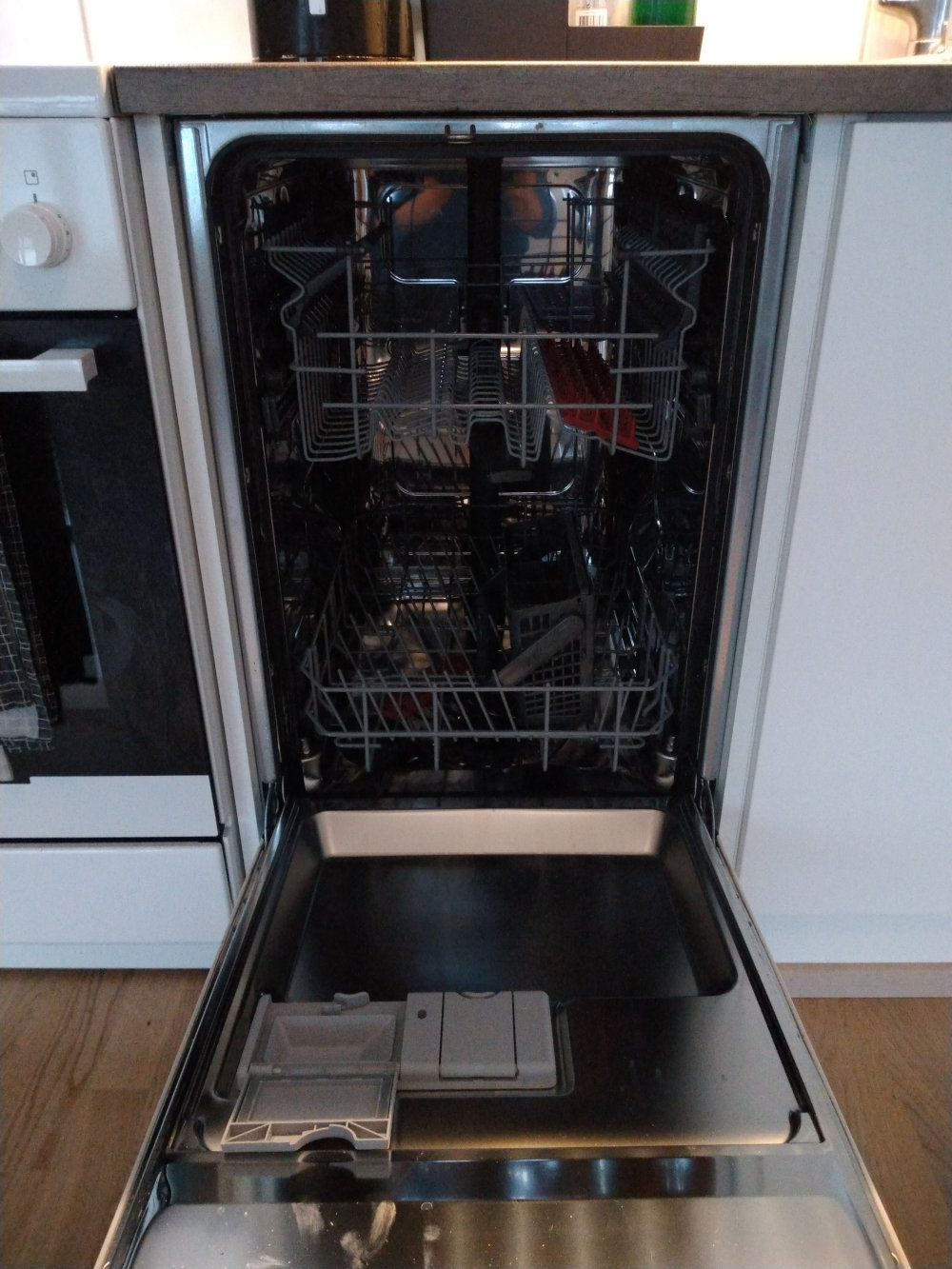List items
Items from the current list are shown below.
Blog
29 Oct 2020 : Dishwasher or washing up bowl. Which is really better for the environment? #
Last week I considered whether I should be buying stuff in plastic packaging in preference to glass. So since I've started this game, I thought it would be good to move on a step and look at another part of my life.
The rented flat where I live comes with a dishwasher, but I've never actually used it. The main reason is that I don't have enough crockery to fill it, but maybe I should? I've been told in discussion, and also by advertisements, that using a dishwasher is more ecological than washing up by hand. This always seemed a bit implausible to me, but maybe it's true?
Let's find out.
First of all, how much energy is needed to do a batch of washing up? This depends on what you do, but my washing up regime is pretty consistent: I fill the sink with water that's as hot as I'm comfortable splooshing around in. I never use more than one sink's-worth since, as I already mentioned, I don't have much crockery anyway.
To work out how much energy it takes for me to wash up we need two things: the amount of water, and the temperature increase of the water.
For the amount I filled the sink using my kettle. It took a total of six kettle-cycles. Each cycle I weighed the kettle before and after and recorded the weight difference. Adding up all of these differences gave me the total weight of water that went into the sink: $10.234\ {\rm kg}$.
The temperature I find comfortable in the sink is $38^{\circ} {\rm C}$, which is a raise of $18^{\circ} {\rm C}$ (or 18 Kelvin) above room temperature.
A quick skim of the Web reveals that the specific heat capacity of water at this temperature is $4179.6\ {\rm J}\ {\rm kg}^{-1}\ {\rm K}^{-1}$.
So, to calculate the energy $E_S$ required (where $S$ stands for sink), we need to multiply everything together like so.
\begin{align}
E_S &= 4179.6\ {\rm J}\ {\rm kg}^{-1}\ {\rm K}^{-1} \times 10.234\ {\rm kg} \times 18\ {\rm K} \\
&= 769932\ {\rm J} \\
&= 770\ {\rm kJ}.
\end{align}
That's the first half of our comparison. Now we need the energy $E_D$ used by the dishwasher (I'll leave you to figure out what the $D$ stands for). The diswasher is an AEG F77420W0P (energy efficiency class A++) and luckily the dishwasher manual has a handy table that lists the energy requirements of the different modes. The table only has the values in kilowatt hours, but this is just a different unit for measurement energy. In fact $1\ {\rm kWh} = 3.6 \times 10^6\ {\rm J}$, so we can calculate the kJ by multiplying the kWh values by 3600.
I don't know what these different modes — ECO, Auto and PRO — are for, but let's assume we'd be using the ECO setting. This means that for my dishwasher, in ECO mode, we have $E_D = 2520\ {\rm kJ}$.
And now we have what we need to do a comparison.
A washing up session takes $770\ {\rm kJ}$ whereas a dishwasher load takes $2520\ {\rm KJ}$; one dishwasher load is the equivalent of 3.27 sinks of washing up. My dishwasher is of the slim variety, but it still holds up to 14 plates, plus a bunch of other stuff. So if I wash at least 5 plates with each sink of water, then the sink will end up being more ecological in the long run. That's not unreasonable and suggests to me that in fact, the sink and dishwasher are fairly similar in terms of their energy use.
However, another factor is the water usage. The manual states that 9.9 litres of water are needed for an ECO load. That's the same amount as a single dish washing session in the sink, so the comparison here is in favour of the dishwasher.
To summarise, it does indeed seem that if you're doing a full load, you'd be better off (environmentally speaking) using the dishwasher. If you're doing less than a full load, the sink could well be better.
None of this includes the energy needed to build the dishwasher. According to this article in The Guardian, for an appiance that lasts 10 years this could add an extra 20% environmental cost, but I've not seen the calcuations and I couldn't find the actual figures for my dishwasher, so I'm not including that here.
These numbers are also all rather specific to my situation of course. A bigger dishwasher might be more efficient. For me, it's a little academic, since it would impossible for me to fill the dishwasher, so the future for me is clear: more washing up.
The rented flat where I live comes with a dishwasher, but I've never actually used it. The main reason is that I don't have enough crockery to fill it, but maybe I should? I've been told in discussion, and also by advertisements, that using a dishwasher is more ecological than washing up by hand. This always seemed a bit implausible to me, but maybe it's true?
Let's find out.
First of all, how much energy is needed to do a batch of washing up? This depends on what you do, but my washing up regime is pretty consistent: I fill the sink with water that's as hot as I'm comfortable splooshing around in. I never use more than one sink's-worth since, as I already mentioned, I don't have much crockery anyway.
To work out how much energy it takes for me to wash up we need two things: the amount of water, and the temperature increase of the water.
For the amount I filled the sink using my kettle. It took a total of six kettle-cycles. Each cycle I weighed the kettle before and after and recorded the weight difference. Adding up all of these differences gave me the total weight of water that went into the sink: $10.234\ {\rm kg}$.
The temperature I find comfortable in the sink is $38^{\circ} {\rm C}$, which is a raise of $18^{\circ} {\rm C}$ (or 18 Kelvin) above room temperature.
A quick skim of the Web reveals that the specific heat capacity of water at this temperature is $4179.6\ {\rm J}\ {\rm kg}^{-1}\ {\rm K}^{-1}$.
So, to calculate the energy $E_S$ required (where $S$ stands for sink), we need to multiply everything together like so.
\begin{align}
E_S &= 4179.6\ {\rm J}\ {\rm kg}^{-1}\ {\rm K}^{-1} \times 10.234\ {\rm kg} \times 18\ {\rm K} \\
&= 769932\ {\rm J} \\
&= 770\ {\rm kJ}.
\end{align}
That's the first half of our comparison. Now we need the energy $E_D$ used by the dishwasher (I'll leave you to figure out what the $D$ stands for). The diswasher is an AEG F77420W0P (energy efficiency class A++) and luckily the dishwasher manual has a handy table that lists the energy requirements of the different modes. The table only has the values in kilowatt hours, but this is just a different unit for measurement energy. In fact $1\ {\rm kWh} = 3.6 \times 10^6\ {\rm J}$, so we can calculate the kJ by multiplying the kWh values by 3600.
| Mode | Energy (kWh) | Energy (kJ) | Water (l) |
|---|---|---|---|
| ECO | 0.7 | 2520 | 9.9 |
| Auto | 0.5 — 1.2 | 1800 — 4320 | 6.0 — 11.0 |
| PRO | 1.3 — 1.4 | 4680 — 5040 | 11.0 — 13.0 |
I don't know what these different modes — ECO, Auto and PRO — are for, but let's assume we'd be using the ECO setting. This means that for my dishwasher, in ECO mode, we have $E_D = 2520\ {\rm kJ}$.
And now we have what we need to do a comparison.
A washing up session takes $770\ {\rm kJ}$ whereas a dishwasher load takes $2520\ {\rm KJ}$; one dishwasher load is the equivalent of 3.27 sinks of washing up. My dishwasher is of the slim variety, but it still holds up to 14 plates, plus a bunch of other stuff. So if I wash at least 5 plates with each sink of water, then the sink will end up being more ecological in the long run. That's not unreasonable and suggests to me that in fact, the sink and dishwasher are fairly similar in terms of their energy use.
However, another factor is the water usage. The manual states that 9.9 litres of water are needed for an ECO load. That's the same amount as a single dish washing session in the sink, so the comparison here is in favour of the dishwasher.
To summarise, it does indeed seem that if you're doing a full load, you'd be better off (environmentally speaking) using the dishwasher. If you're doing less than a full load, the sink could well be better.
None of this includes the energy needed to build the dishwasher. According to this article in The Guardian, for an appiance that lasts 10 years this could add an extra 20% environmental cost, but I've not seen the calcuations and I couldn't find the actual figures for my dishwasher, so I'm not including that here.
These numbers are also all rather specific to my situation of course. A bigger dishwasher might be more efficient. For me, it's a little academic, since it would impossible for me to fill the dishwasher, so the future for me is clear: more washing up.



Comments
Uncover Disqus comments